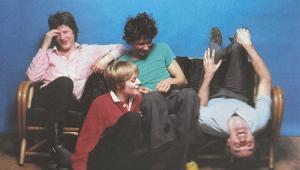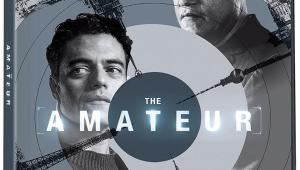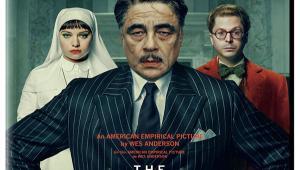Graham Parker Squeezes Out Hi-Res Audio Sparks
It’s been a long, interesting, winding road for Parker, who now finds himself under the Universal umbrella after spending a number of years as an indie artist. Universal is also the company that owns the Mercury Records imprint, the label that Parker masterfully skewered in the infamous “Mercury Poisoning,” from 1979’s brilliantly brusque Squeezing Out Sparks. No hard feelings, right? “It’s a different world after being with various indie labels,” Parker says. “It’s really interesting. I was just at Abbey Road Studios the other day doing a performance for Universal, and I found out they now own it! I’m with the record company that owns Abbey Road — so they must have a few bucks, right?”
Parker, 64, called from across the Pond to discuss his overall sonic goals for Mystery Glue, how and why his voice has improved over the years, and what he thinks of his earliest work. His passion for quality ain’t manufactured or just another sound.
Mike Mettler: The way I understand it is you wrote the material for Mystery Glue in New York and then recorded in London — is that right?
Graham Parker: Yeah, I guess that’s the way it went down. The famous RAK Studios is just a walk from my flat in London — as is Abbey Road, as a matter of fact. It’s an easy walk for me, so that was the place to do it. RAK has that old-school feel to it. I’ve never worked there before. We had a great time doing it, and everyone enjoyed being there. And at the end of the road there in London is Regent’s Park, so if you want to get a breather, you go to the Park.
Mettler: Was Mystery Glue pretty much cut live, with everyone in the room together?
Parker: Yeah. It’s all been based on what I did for The Mona Lisa’s Sister (1988), where my voice had improved enough so that as long as I could keep it in shape, I wanted live vocals. I’m just way more in pitch. It’s expressive performance. That’s the way it was for that album and pretty much most of the albums since then, since I’ve been calling myself producer or co-producer.
We had 2 days of rehearsal nearby. It was the usual thing — I try to impress upon the bandmembers where the song is coming from. To me, it’s very clear, but to them, it’s not. That’s where the work comes in, really. You can only get so far in 2 days’ rehearsal. You need to be in a studio and stand back and listen to it. And then I can start again, impressing upon the bandmembers where this song should be going and what it should be doing.
Gradually, the pennies start to drop as the band are playing it. I’ll just pick out something someone is playing and say, “That’s in the bag! That’s in the pocket there.” Luckily, people listen now, and I listen to them. It’s a good, collaborative unit, because we don’t have a strange guy who comes up whom they’ve never met called “the producer.” It’s me and Dave Cook, who they’ve worked with on Three Chords Good (2012).
Mettler: If you don’t mind me saying so, you were more of a “shouter” in the ’70s — maybe partially because of the subject matter — so it’s been nice to hear your voice mature over the years. To me, your vocal on a song like “Pub Crawl” encapsulates where you’re at today.
Parker: I’m glad you spotted that; thank you. It’s changed remarkably, because when I started out, I had no professional experience; I had no professional background. I hadn’t played in all the pubs and working men’s clubs and had things thrown at me, as they do. I built it all up in my head. I just sang as if I was trying to pin people against the wall, which was a good method for the times. It seemed to get people’s attention, and that’s how I felt about things.
But I was really, really lucky. A lot of the time, I lost my voice because I didn’t have any technique, and singing with a band like that [i.e., The Rumour], you couldn’t hear yourself properly, so I had to deal with it. I never got those nodes on the throat, or things like that. And then I got the solo thing going around ’89, doing The Mona Lisa’s Sister and Live! Alone in America (1989). I had to learn how to sing, and I found that I did actually have a voice in there. But it needed a lot of years. It did need a lot of years to come on. “Pub Crawl” — I couldn’t have done that song back then; it would have been terrible. Now it’s got all this subtlety in it.
Mettler: Subtlety is the right word for it. I love the way you start it: “The history is a mystery … might as well embrace it, you see.” There’s a certain character to your vocal throughout the whole song, as you go through a few different permutations. It feels like you’re playing off each other as it keeps going forward.
Parker: It’s perfect. That song is perfect for The Rumour right now. I wrote that song before all the other ones. I thought, “Well, I’m being facetious here.” I’m obviously taking the piss out of the idea that I’m being thought of as a pub rocker sometimes, which still amuses me and annoys me to this day. (chuckles) On the other hand, I don’t really care that much what people call me — just listen to the songs! That would be a good idea.
Mettler: Did you ever wind up taking any vocal lessons over the years, or did you just figure out how to take care of your voice on your own?
Parker: No, I’ve never taken lessons. I was never any good at learning anything in school, so why start now? It’s from experience. It’s from playing solo — being able to calm down and find a voice, and then enjoying what I’m hearing more during playback sessions. It’s been satisfying for me. I just keep adding to it, vocally, with the years of experience. It’s really there on this album. If this is the best I get, then I’m not too unhappy.
Mettler: I’m glad that you brought up The Mona Lisa’s Sister. When I got that album, it felt like a turning point for you because I think it’s fair to say a certain production style got in the way of your intentions on your mid-’80 recordings, and then you righted the ship on that album. And that’s what we need from you as both a songwriter and a singer.
Parker: I think you’re right. That’s when I said, “Stop this massive drum sound! Let’s make an album where the basis of it is a guy with a guitar, singing.” That’s been my process ever since then. I’m a singer/songwriter first and foremost. Forget all the other junk. I want my records to reflect that every time, even all the hard-rocking tracks — that’s the basis of it now.
Mettler: Does the way people listen to music these days enter into your mind when you’re recording?
Parker: Listening to music is not the foremost of my activities these days, like it used to be when you got a new album by somebody like a John Prine or Bob Marley and The Wailers with Catch a Fire (1973) — these are big turning points. It seems to me it’s a younger man’s thing now. It’s not at the front of my radar.
But I have got an awesome stereo system in my flat here in London. I was at someone’s place here the other day and he’d gotten out some vinyl to put on. When he pumped up the volume, I thought, “Wow, it’s time for me to get into a bit of that!” So I’m coming back around.
Mettler: What kind of gear do you have in your system?
Parker: It’s a Linn Sondek [LP12] turntable. Good stuff. The speakers are big ’70s-style, like back when people got into the boutique-style speakers. The amplifier is Cambridge Audio.
Mettler: Do you think high-resolution 96/24 downloads should be the way people listen to what you’re doing now?
Parker: Some European journalists I’d been doing interviews with said they’d got files of the new album, saying, “I know it’s going to better than this when I get the high-def [version].” They want the high-def, and people’s ears are going back again that way. We’ve been fooling around for too long with these tiny MP3s. It’s all very convenient for musicians to send somebody an MP3 for them to learn the chords or whatever, but I think we’re really going back towards high-def listening. People want to be enveloped in the music.
After Dave Cook and I had mixed the album, Andrew [Bodnar], our bass player, got it and played it on a CD, and he said, “It feels like I’m being enveloped in this warm sound.” He was very pleased with it. And obviously, it’s come out on vinyl as well. which is quite good. I think people should definitely listen to it in the hi-res format if they can, on a high-quality system.
Mettler: The convenience of MP3 sold us on that format in the beginning, but when you, as a producer, go from that final mix to the master and then find things that are missing, that has to be frustrating. To get a high-res version of a track like “My Life in Movieland,” with the way that piano comes in at the beginning, and then the solo section from the “mouth harp,” as I’m going to call it —
Parker: Oh, you mean my kazoo? Somebody said to me, “Are you playing a comb there?” I said, “No, it’s my kazoo — but that’s not a bad idea! I must start practicing on my comb.” (both chuckle)
When we’re in the studio, we’re trying to make a seriously great-sounding record. We’re trying to make an analog-sounding record. We used the computer purely as a tape recorder on this record. We go through analog gear, but it’s not recording to tape, which is something I don’t want to go back to. For one thing, 24-track tape costs a lot of money, and it costs a lot to make an album. Waiting for the rewind — you don’t want to do that anymore if you can help it. But you can make a record sound old and analog — the sound of when they were good — to a certain extent. I’m not a purist and never will be, but I’m always trying to do that. I’m listening to every detail on the record, and so is my co-producer/engineer [the aforementioned Dave Cook]. Of course we want people to hear it very well. When you bring people into the studio to hear the mixes, you say, “Get a load of this on the big speakers!” Do you know what I mean?
Mettler: I sure do! Do you have a personal favorite Mystery Glue track right now? Is it easy to narrow that down?
Parker: Oh, my goodness. No, I don’t, really. I’m very proud of the beautiful melodic structure of “Transit of Venus”; I like that a lot. “Slow News Day” is a lot of fun; I love it. When Bob [Andrews, keyboards and backing vocals] and Brinsley [Schwarz, guitarist] started doing vocals, I said, “Bring it on! More and more harmonies — do it! Whatever you’ve got up your sleeve, bring it. That’s what I want.” Because they didn’t really understand the song. Brinsley thought, “Oh, it’s The Beatles!” And I said, “It’s really a Ray Davies tune, but it’s not far off The Beatles, so bring me the harmonies, guys.” So I’m pleased with that.
Mettler: To borrow a phrase, passion is no ordinary word when it comes to your vocal character on Mystery Glue. It seems like you’ve captured it perfectly.
Parker: Well, thank you, I really appreciate it. A few people mention the singing. You always get fans who see a show and I’ll sign a few records for them, and they’ll say, “You sound as good as ever!” And I want to say, “No — no I don’t, actually! But I’ll take that as a compliment!” It’s always good when someone says, “Your voice is way better! It’s totally different. It’s great!” Either way, I’ll appreciate any compliment. It’s ok. (chuckles)
Mettler: My view is a song is a snapshot of when you recorded it, so it’s interesting to see how it evolves over the years and if it has a different feel as time goes on — and it should.
Parker: Yes. You can’t — well, I wouldn’t want to try to recreate things. The Rumour play differently now. They play like I sing, I think. To try and say, “We’ve got to be just like we were, in a frenzy” — totally stupid is the only word I can think of. We’re trying to be as good as we are. We’re trying to be ourselves. All those different things have come through, and there are those who would rather it be like 1976, but it cannot be like that. It cannot be.
Having said that, I think those albums are good. Howlin Wind (1976) is probably my favorite. This new album is as naturally playing as that. I think Howlin’ Wind and Mystery Glue can work together quite well as two listens in a row, you know?
Mettler: There is a glue and a thread between the two, yes. You can see the throughline in terms of the level of passion — there is a vibe and an energy on Mystery Glue that shows the DNA of where it comes from.
Parker: Yeah. I’ve said it before, but I think I’ve got a blueprint for songwriting. It bounces off of that every now and again. I do have all of these stylistic components that were there on Howlin Wind. Go back to that. It wasn’t just “pub rocka-rocka-rocka” stuff. There was “Between You and Me,” there was “Gypsy Blood.”
Mettler: Like you said, it all comes down to the depth of the songwriting. People do like to label things, though.
Parker: It wasn’t just razzmatazz as it was with punk, that’s for sure. Punk was a minimalist performance-art thing that was a little off to the side of what I was doing. I was very inspired by very good songwriters, including people like James Taylor and Jackson Browne.
Mettler: And one minor songwriter by the name of Bruce Springsteen seems to like what you’re doing, so that’s not so bad either.
Parker: I like what he’s doing too as well! (chuckles) He’s none too shabby either, let’s face it. I’m always flattered that he’s a great appreciator of my work.
Mettler: There’s some parallel here. You two are of similar age, and there was a certain style you each had in your 20s, and now we can see how you’ve matured as songwriters. As a listener, I like hearing where a songwriter is at as you move through life. We get to hear the other chapters. There’s a thing some people have about how you shouldn’t write new material when you get to a certain age, but I say, “Why not?” Why do people say things like that?
Parker: Yeah. It’s a younger man’s idea, isn’t it? When I was in my 20s, I thought, “My goodness, I’m not going to be doing this when I’m over 30.” But the next thing I know, I’m 40, and now suddenly I’m 64, and I come up with Mystery Glue. So there’s no sense to say, “Why are you still doing this?” There really isn’t.
Mettler: “When I’m 64” — there could be a song title in there somewhere, come to think of it…
Parker: Yeah, yeah, I’ll work on that! (both laugh)
A longer version of this interview appears on Mike Mettler’s own site, soundbard.com.































































